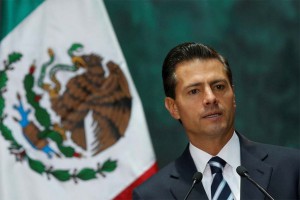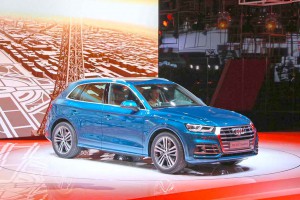Since launching his presidential campaign, then-candidate Donald Trump has seemingly been at war with Mexico, taking particular aim at that country’s fast-growing auto industry. He called out Ford, in particular, for moving small car production south of the border, and also warned General Motors it could face a big border tax for importing Mexican-made vehicles.
Since January, the new president has frequently pointed to new U.S. automotive investments, while also highlighting Ford’s decision not to build a second plant in Mexico. But a new report from that country’s automotive trade association may be less well-received by the White House.
Overall, Mexican automotive exports rose 16.1% in April, compared to year-earlier numbers, while production jumped a more modest 3.2%, according to the Mexican Auto Industry Association, or MAIA. For the first four months of the year, meanwhile, total exports jumped 15 percent.
Exports directly targeting the United States, meanwhile, surged by nearly 20% year-over-year, to 179,958 vehicles.
(Mexico trade chief says NAFTA redo must benefit everyone. Click Here for the story.)
The Mexican auto industry is now one of the world’s six largest, ranking up there with China, the U.S., Japan, South Korea and Germany. And it now produces about a fifth of all the vehicles assembled in North America.
But where all those countries routinely absorb the majority of the vehicles they produce, Mexico has a relatively small domestic car market. So, even though local demand jumped a solid 19% in 2016, to an all-time record, demand was still a meager 1.6 million vehicles for a population of 127 million people. On a per capita basis, that’s barely a quarter of what was sold in the U.S. last year, where total sales came to a record 17.5 million.
So, the vast majority of vehicles are being exported. According to the MAIA, Mexican assembly plants produced 278,173 vehicles in April, but a full 228,810, or roughly eight in 10, of those were exported.
Little more than an automotive backwater a decade ago, Mexico has become a global powerhouse. Virtually every major manufacturer currently operates a production facility in the country, or has one coming. And where once that was focused on econo-cars and mainstream brands such as Ford, General Motors and Nissan, Mexico is now attracting more up-market marques like Audi and Infiniti, both opening plants there last year. Mercedes-Benz plans to share the new Infiniti plant in Aguascalientes starting in 2018.

Mexican Pres. Enrique Pena Nieto and members of his government are under pressure from Pres. Trump to re-open NAFTA.
The draw? Cheap labor usually gets the credit, Mexican autoworkers taking home less in a week than a typical American line worker makes in a day. But there’s another critical factor: Mexico has lined up more free trade agreements than any other country but Israel, making it an ideal place to export from. A number of new facilities serve as global export bases for specific models. The Audi plant, for example, is the only production site for the completely made-over Q5 SUV.
(Automakers hoping Trump infrastructure plan will stave off U.S. sales slump. Click Here for more.)
While the April numbers show that the Mexican auto industry continues to grow, the news might be coming at an inopportune time. As a candidate, Donald Trump said he wanted to scrub the North American Free Trade Agreement and possibly put a double-digit tariff on Mexican-made cars and car parts.
Trump has more recently backed off on that pledge, however, apparently bowing to intense pressure from the auto industry – notably including the powerful auto dealers lobby. But he still says he wants to renegotiate parts of the agreement to make it more favorable to the United States. Reports like this one could provide ammunition for the White House to demand concessions from Mexico.
(Trump backs off on threat to pull out of NAFTA. Click Here to learn why.)


